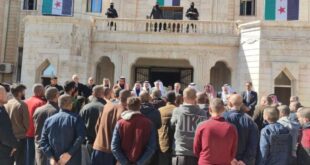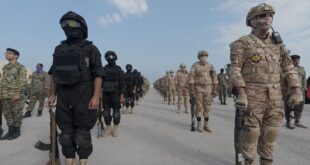Iraqi politicians said on Thursday they were hoping for a breakthrough to restore a unity government after a Sunni Arab bloc quit, but the magnitude of the sectarian conflict was underlined by the slaying of five brothers.A suicide bomber drove a car bomb into a queue of recruits at a police station north of Baghdad, killing 13 people a day after bombs killed more than 70 people in the capital.
Demonstrating the viciousness of sectarian violence, a young boy, crying but unharmed, was found next to the bodies of his five brothers near the northern city of Kirkuk after they were kidnapped by gunmen a day earlier.
The biggest Sunni Arab bloc, the Accordance Front, triggered what Kurdish Deputy Prime Minister Barham Salih called the worst political crisis since Iraq’s new constitution was adopted by pulling out of Prime Minister Nouri Maliki’s government on Wednesday.
But a senior member of parliament from Maliki’s  Shiite bloc said a “breakthrough is possible†in resolving the standoff.
Rida Jawad Takki told Reuters: “Talks are continuing among the heads of the political blocs. The prime minister and the (Shiite) Alliance are ready to find a solution along with the Accordance Front. Things are not that difficult.†Bringing Sunni Arabs into the government was billed as a major achievement towards reconciliation when the Cabinet was formed last year. But Sunnis complained they were marginalised and key laws demanded by Washington have not been passed.
Politicians from leading groups are due to have a summit in coming days in the hopes of restoring the power-sharing system.
“Now there are daily meetings and committees are working to prepare for the summit, in which we hope the leaders will avoid any escalations and agree on common issues,†Salim Jubouri, a leading Accordance Front member of parliament told Reuters.
Maliki’s office said the prime minister would remain in “permanent contact†with the Front despite their decision to quit the government.
Washington has hinted at its frustration with Iraqi politicians ahead of a progress report on the war due next month expected to cause a showdown between President George W. Bush and Democrats in Congress, who want US troops brought home.
White House spokesman Tony Snow said Bush told Maliki in a videoconference that “the Iraqi people and the American people need to see action, not just words†from Iraqi leaders.
Thursday’s biggest attack took place in Diyala province, the area north of the capital which has been a focus of a US offensive over the past two months after Washington dispatched extra troops to Iraq to help stabilise the country.
A police source said the suicide bomber struck recruits lined up to join the police force in the town of Hibhib, north of Baghdad. The dead included six policemen and seven civilians.
Washington says the area has seen an influx of Al Qaeda militants driven out of Baghdad and western Anbar province as a result of the US offensive and a revolt against its members by local tribes.
Further north, more than 1,000 Iraqi troops launched a crackdown on insurgents in Samarra, where an attack on a Shiite shrine last year triggered sectarian fighting across Iraq. The mosque was attacked again in June.
The Iraqi forces closed streets and imposed a curfew. The US military said the goal of the Iraqi operation was to stabilise the city so the shrine could be rebuilt.
 Eurasia Press & News
Eurasia Press & News



